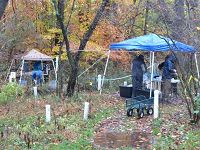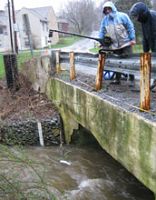Scientists Sample Stormwater in Eye of Hurricane Sandy
07 Nov 2012
News Source: Stroud Water Research Center
Hurricane Sandy has brought significant devastation to some East Coasters, but for scientists at Stroud Water Research Center, the University of Delaware, and the University of Exeter, it was another golden opportunity to collect stormwater data that will be pivotal in addressing issues related to climate change.
Storms bring flooding, and flood waters are teeming with activity that, if recorded and analyzed, can reveal much about the carbon they transport, and carbon is key in understanding the global cycling of greenhouse gases, which is the primary goal of the Christina River Basin Critical Zone Observatory (CRB-CZO). Funded through a grant from the National Science Foundation, the CRB-CZO, one of only six in the United States, is at the forefront of research to determine the role human impact on the hydrological, mineral, and carbon cycles plays in climate change.
News Source:
READ MORE from Stroud Water Research Center >>
Photos
CRB-CZO Scientists Sample Stormwater in Eye of Hurricane Sandy

Steve Hicks, Sara Damiano, and Denis Newbold make the final adjustments on an ISCO automated sampler and the Center's very own invention, the Dial-A-Pump, which fills a barrel from a cell phone trigger. Together they sampled stream waters during the most intense moments of the storm. Such systems were placed at nine stream and river sites throughout the Christina River Basin. Photo: Anthony Aufdenkampe (Stroud)

The newly installed trapezoidal flume at Boulton Run, an ephemeral tributary to White Clay Creek near the Center. Precisely engineered structures such as this are the the only means to accurately measure flow rates in small streams during storms. Photo: Anthony Aufdenkampe (Stroud)

Stroud Water Research Center's team sampling shallow groundwaters in the floodplains at Transect A on White Clay Creek. Photo: Anthony Aufdenkampe (Stroud)

David Montgomery, Sherman Roberts, and Mike Gentile drawing and filtering samples during the first downpour from Sandy. Photo: Anthony Aufdenkampe (Stroud)

Denis Newbold making a precise electrical tape measurement of White Clay Creek water height at the stilling well on Spencer Road, for reference to our 40 year record at that location and for comparison to new methods. Photo: Anthony Aufdenkampe (Stroud)

Bill Anderson and Sara Damiano deploying an Acoustic Doppler Current Profiler, the now recommended method of measuring stream flows, to compare with our 40-year record. Photo: Anthony Aufdenkampe (Stroud)
For scientists at Stroud Water Research Center, the University of Delaware, and the University of Exeter, Hurricane Sandy was another golden opportunity to collect stormwater data that will be pivotal in addressing issues related to climate change.
People Involved
CZO
-
Christina, INVESTIGATOR
-
National, Christina, STAFF
-
Christina, VOLUNTEER
-
Christina, STAFF
-
Christina, STAFF
-
Christina, INVESTIGATOR
Explore Further










